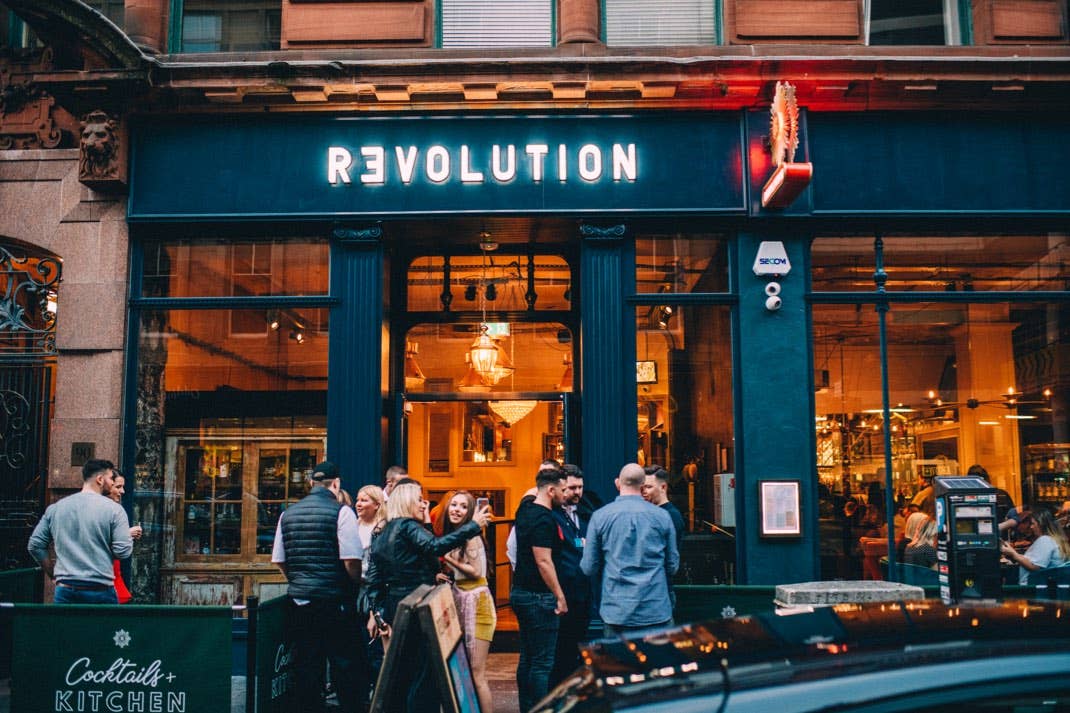Revolution Bars says nightlife sector facing tough times as it swings to loss
The group said young people were facing a cost-of-living squeeze and visitor numbers were being hit by train strikes.

Your support helps us to tell the story
From reproductive rights to climate change to Big Tech, The Independent is on the ground when the story is developing. Whether it's investigating the financials of Elon Musk's pro-Trump PAC or producing our latest documentary, 'The A Word', which shines a light on the American women fighting for reproductive rights, we know how important it is to parse out the facts from the messaging.
At such a critical moment in US history, we need reporters on the ground. Your donation allows us to keep sending journalists to speak to both sides of the story.
The Independent is trusted by Americans across the entire political spectrum. And unlike many other quality news outlets, we choose not to lock Americans out of our reporting and analysis with paywalls. We believe quality journalism should be available to everyone, paid for by those who can afford it.
Your support makes all the difference.Revolution Bars said the late-night hospitality industry is facing “very challenging” times as it swung to a yearly loss and revealed a drop in sales.
The group, which runs Revolution, Revolucion de Cuba and Peach Pubs, said young people were facing a cost-of-living squeeze and visitor numbers were being affected by train strikes.
It told investors its total revenues were up by £11.8 million to £152.6 million in the year to the end of July compared to the previous year, after taking over Peach Pubs – a chain of 21 gastropubs focussed in UK market towns – last October.
But like-for-like sales, which strips out new venues that were not trading as part of the company a year ago, were down by 8.7%.
The macroeconomic challenges facing the industry impact on both our guests' available spending as well as profitability of the business
The group said it swung to a statutory pre-tax loss for the year of £22.2 million, having made a profit of £2.1 million a year ago.
Chief executive Rob Pitcher said there had been a “seismic shift” after the Covid pandemic, with the cost-of-living crisis now being the most significant factor impacting the hospitality sector.
Young people, who are the key demographic for its Revolution bars, have been the most impacted by high inflation, which has reduced the value of their wages, he said.
The budget squeeze has “directly impacted their ability to spend on discretionary items such as nights out”.
Train strikes preventing people travelling to city centres has disrupted major events and key trading days across the UK, the boss said, including payday weekends and the week before Christmas.
But Revolution said it was adapting to the changing climate, including the shift to hybrid working, with its Peach Pubs chain appealing to an older guest base which is more insulated from the cost-of-living crisis.
A rebound of young professional guests has driven up pre-booked Christmas sales more than 17% higher this year compared to last year, and a return of students has helped improved sales in recent weeks.
Revolution said inflation in the UK has “hopefully” peaked and is now starting to fall while consumer confidence is starting to rise.
The group, which at the start of the year moved to shut its bars on Monday and Tuesdays over rocketing electricity costs, said energy usage was down by more than a third since 2017 and it had cut costs across its bars.
We join UK Hospitality in calling for the crucial festive season to be protected and for an urgent resolution to the ongoing rail dispute
Mr Pitcher said: “The macroeconomic challenges facing the industry impact on both our guests’ available spending as well as profitability of the business.
“This is a key area of focus for our management teams, and we are pleased to see the impact of our sales-driving initiatives coming to fruition, alongside active cost management.
“We join UK Hospitality in calling for the crucial festive season to be protected and for an urgent resolution to the ongoing rail dispute.
“Not only do the strikes have a significant impact on sales and profitability, but most importantly they affect our colleagues’ earning potential through lost shifts and tips which the teams rely on to see them through the quieter trading months of January and February.”